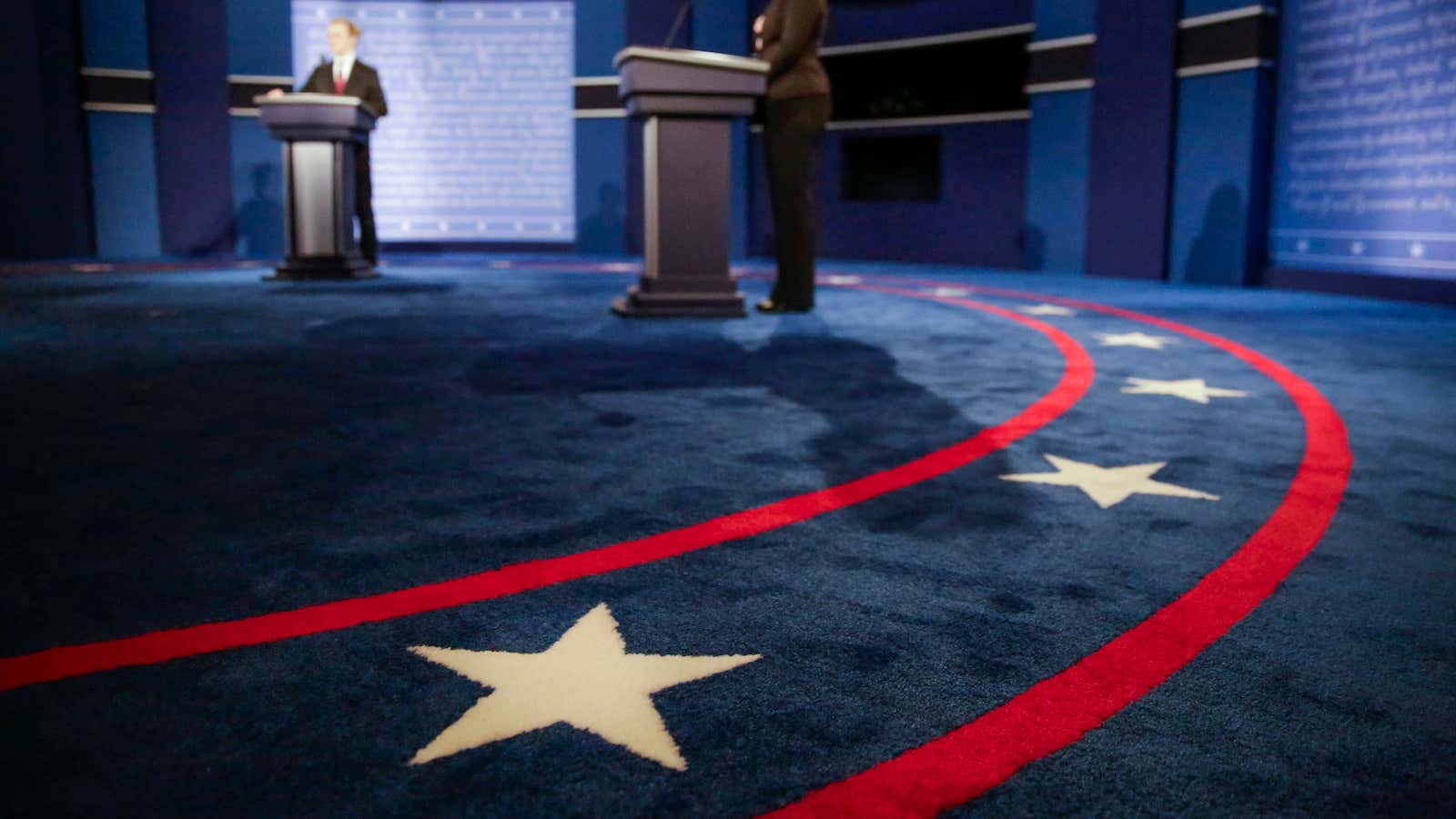Bo Seo and Fanele Mashwama are the reigning champions of the World Universities Debate Championships, the largest and most prestigious collegiate debate competition in the world. Ahead of the first presidential debate, the Harvard students share some advice on winning debates:
Collegiate debate is a difficult activity to describe. We learned this from hours of frustrating conversations with confused roommates, deterred romantic interests, and suspicious airport security. The rules are basic enough: a motion, a side, and 15 minutes of preparation. But the world that emerges is far from simple.
For many, debate is less an activity than an all-consuming way of being. High off the promise that they will, one day, legislate on these issues for real, debaters sleep on the floors of college dorms. Sandwiched beside each other in rooms not built to accommodate their number, they sleep 4-hour nights and prepare for 12-hour days of fierce competition. They gorge on cheese pizza, the staple of only one other species: the coder. This is the world we inhabit.
The two of us met on a bus in Antalya, Turkey, when we were high school students representing Australia and Swaziland. Since then, we have shared countless rides: the car trip that took us to a World Championships win in Thessaloniki, the never-ending plane ride back to Harvard from a National Championships loss in Anchorage, and the shuttle that nightly takes us from Widener Library to our dorms.
Over the course of these rides, we have tried to figure out what makes for good debating. Ahead of the presidential debates between nominees Donald Trump and Hillary Clinton, we offer three insights from the world of collegiate debate.
Responsiveness
The first aspect of the candidates’ performances to watch for is their responsiveness. By this, we mean both their responsiveness to the moderator’s questions and also to their opponent’s points of disagreement.
Unlike in public speaking or acting, competitors have no chance of succeeding solely with rehearsed material—it requires competitors to directly engage each other. Few experiences are as jarring as watching debaters offer non-answers to the other side’s questions and segue instead to pre-packaged and faintly related talking points. This was painfully demonstrated during the 2016 primaries when governor Chris Christie gleefully labeled Senator Marco Rubio’s curious “[Obama]-knows-exactly-what-he’s-doing” refrain a “memorized 25-second speech.”
While candidates may have the reasonable desire to steer the conversation in a certain direction, there are few substitutes for earnest responsiveness in debate. This is because debate rewards the sincere and conscientious attempt to take the views of the rival position seriously. A persuasive—albeit counterintuitive—debate tactic is therefore taking the most charitable interpretation of an opponent’s position and demonstrating why, even under that interpretation, their view is mistaken. Both Trump and Clinton could benefit from employing this device.
Clarity of message
The second aspect to watch for is the clarity of the candidates’ overarching messages.
The most difficult aspect of debate is listening—both as the opponent and as an audience member. To sit for hours and try to understand imperfectly articulated, occasionally complicated, and rapidly delivered arguments is hard work. As a result, debaters can often trade off intricate detail for conceptual clarity—and win. This is why crisp and timely quips emerge as the most memorable feature of many debates. For example, recall president Obama’s cut-through response to governor Mitt Romney’s detailed criticism of US naval capability in the final 2012 presidential debate: “The question is not a game of Battleship where we’re counting ships.”
Politicians excel at obfuscation. This fact is partially reflected in the increasing disaffection with the political class, both in the US and abroad. The public resents it when their leaders disguise politically inconvenient or underdeveloped positions by confusing the discussion surrounding them—such as secretary of defense Donald Rumsfeld’s infamous 2002 talk of “known unknowns” in relation to the purported link between Baghdad and al-Qaeda.
So if you find yourself struggling to understand a candidate’s stance on an issue raised in the debate, we venture that this is more likely a failing on their part than on yours. The ability to intelligibly communicate specific policy proposals to non-experts should be a requirement for the most important political office on the planet.
Authenticity
The final point is stylistic.
Authenticity is crucial to understanding a candidate’s relative performance in a debate. This is especially true in the presidential debates—persuasion always requires the trust of those whom you are trying to persuade. But the stakes are even higher in 2016, when the character and temperament of the candidates—their essential trustworthiness—is the central issue up for debate.
Debates span across a vast intellectual terrain, covering issues ranging from inclusive economic growth to national security. A successful debater acts as a guide across these many issues, and therefore must convey a foundational character that transcends the idiosyncrasies of any one issue—each answer or position must make sense in the context of this greater whole.
Drawing from your personal background is therefore key to making a genuine connection. Our career in debate—the arguments we did and did not make, the strategic positions we did and did not adopt—has been uniquely informed by our personal histories: that of two best friends from Sydney and Ezulwini. It is an extension of who we are: an Asian immigrant, and a black African. By relating to our competitors and our audience from a personal standpoint, the heart of our argument speaks for us.
Conclusion
Millions of Americans will tune into the presidential debates—more than the Super Bowl, as some have reported—but only a fraction of that population will actually be listening out for the candidates’ policy platforms. This suggests that what matters to us is not just what is said, but how it is said—and by whom. This debate season, the best debaters will deliver what audiences want most: responsiveness, clarity, and authenticity.




